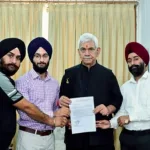Srinagar, Jan 09: The Directorate of Research successfully wrapped up an intensive week-long Capacity Development Programme centered on the HADP project “Alternate Agriculture Systems.” Attended by 25 officers from the Agriculture Development Department of Kashmir and the Faculty of Horticulture at SKUAST-Kashmir, the training aimed to bolster expertise in sustainable agricultural practices.
The valedictory function witnessed esteemed personalities in attendance. Choudhary Mohammad Iqbal, Director of Agriculture in Kashmir, graced the occasion as the Chief Guest, while Prof. H. R. Naik, Director of Research, was the Guest of Honour. The Training Coordinator, Prof. Nasir Ahmad Dar, delivered an encompassing overview of the program’s agenda.
Highlighting the pressing need for such initiatives, Director of Research emphasized their pivotal role amidst the challenges posed by global warming and the imperative to ensure the sustainability of ecosystems. He advocated the formulation of comprehensive organic crop production practices tailored for farmers.
Choudhary Mohammad Iqbal, Director of Agriculture, focused on the criticality of disseminating innovative technologies to the grassroots level for the benefit and empowerment of farmers. He stressed the far-reaching implications of excessive usage of inorganic chemicals, fertilizers, and pesticides on human health and the broader ecosystem.
Further enriching the discussions, Prof. Prashant Bakshi, Head of Division of Fruit Sciences at SKUAST-Jammu, delivered an expert lecture during the event. Prof. Parmeet extended the Vote of Thanks, while Dr. Baby Summuna efficiently conducted the proceedings as the Training Coordinator.
This culmination of collaborative knowledge sharing and expertise underscores a collective commitment toward sustainable agricultural practices amidst growing concerns over the environmental impact of conventional farming methods. The event has left participants equipped with actionable strategies to promote eco-friendly agricultural systems for a healthier ecosystem and improved human well-being.





